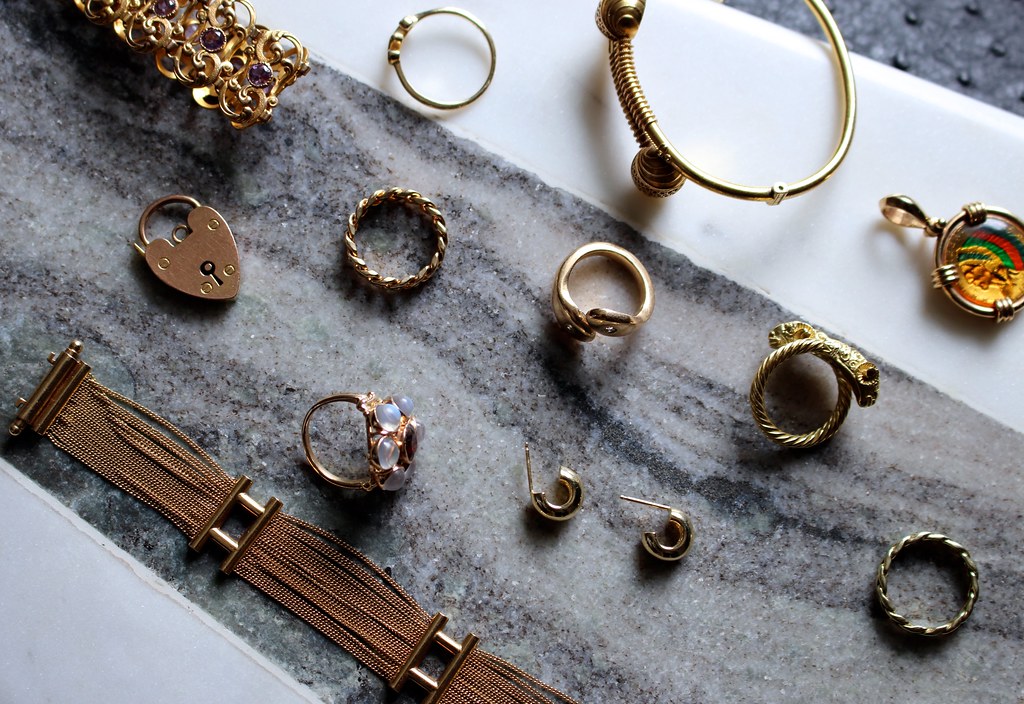
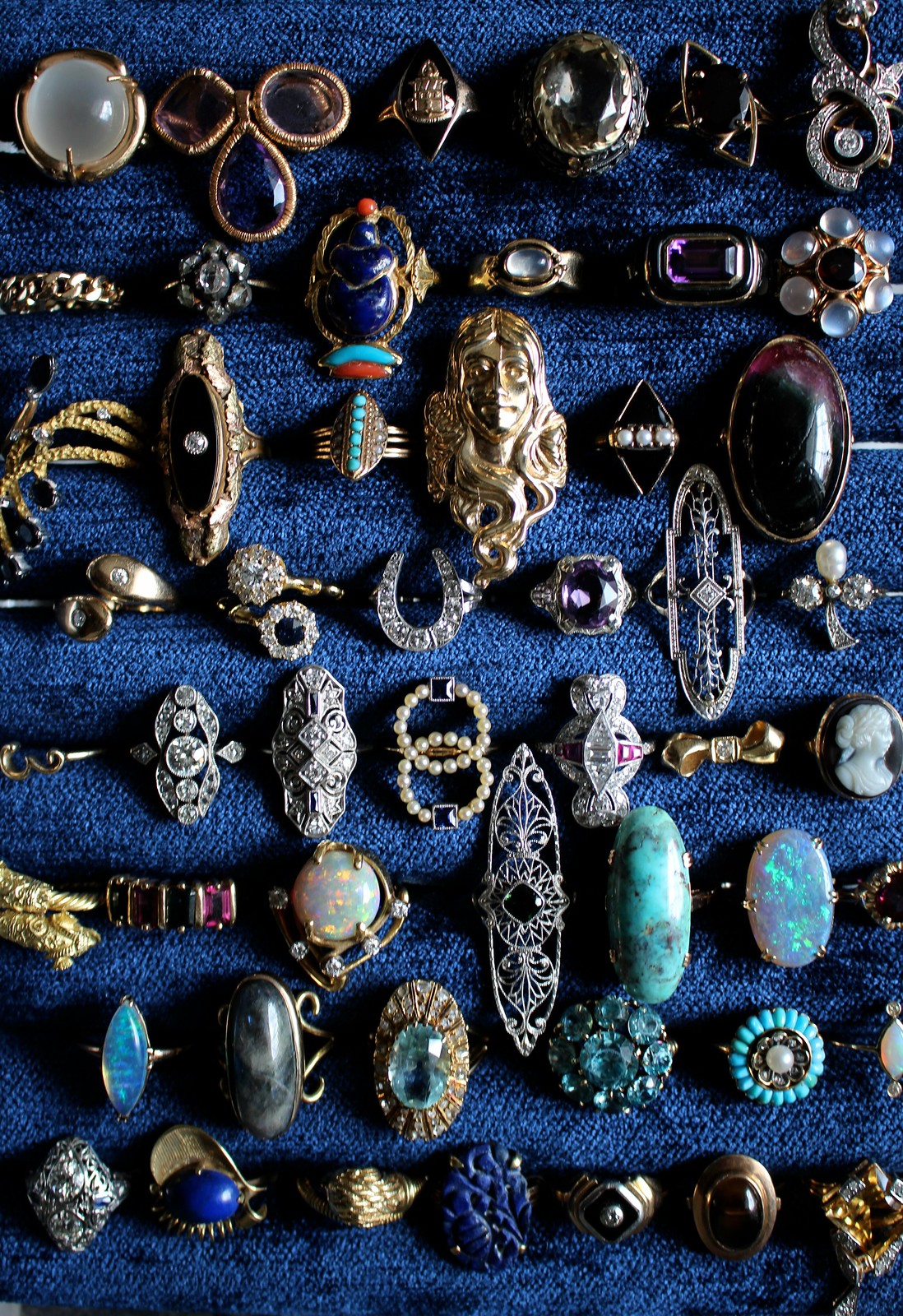
Both Lauren and I have noticed a slightly frightening upsurge in the amount of overnight “antique jewelry dealers” these past few months. I’ve nominated Lauren to give her insight and take on this, along with some important tips we should all be aware of before buying any antique piece online or via Instagram. I’ll let Lauren take it away:
Selling fine second-hand jewelry is no simple task that just anyone can pick up by attending a few estate sales. Dealers must continually strive to expand their education and invest in their business so they can offer the best and most honest experience to their customers.
For me, selling antique jewelry was something I fell into by chance in late 2005. I learned my most basic knowledge by apprenticing under a few dealers that had been in the business for decades. This oral history only took me so far. I then conquered many books, took classes, and met with as many other dealers and jewelers as I could.
This happenstance quickly turned into a full on passion; perhaps it’s even my calling if there is such a thing. Over the next nine years, I evolved my business, Ageless Heirlooms until it took form as a brick and mortar shop on the busiest street in town. The lessons are countless and the experience over these years was immeasurably valuable.
Sometimes life takes you unexpected places, and the moment that I could no longer devote 100% of my time to selling antique jewelry was when I decided to take a huge step backward and regroup in late 2014. I closed my brick and mortar shop and continued writing about jewelry, in the hopes that one day I would get back into retail and help reconnect heirlooms with their next generation keepers.
During my almost three year departure from retail, the antique jewelry business changed a lot. The antique jewelry market, like most any business, has always been prone to scammers and dishonesty. But as this niche market keeps expanding, I’ve noticed that more and more dealers pop in and out of the scene — some legitimate and others that are trying to take advantage of the trend. It saddens me to think that there are dealers out there that are either intentionally or unknowingly misguiding their consumers. It leaves a bad taste in my mouth and perpetuates the idea that buying fine second-hand jewelry is a shady practice. I assure you, it’s not.
Shopping for estate jewelry takes a certain degree of trust in the people you’re buying from, especially if you’re just learning all the ins and outs. Here are some questions you can ask yourself to help you decide if you’re buying from someone who is worth supporting.
1. Are they GIA certified or have any other accreditations?
To have your GIA certification is arguably the most important feat in the fine jewelry world. This certification shows that the dealer has put a tremendous investment in their education and are much more competent at grading gemstones than someone that doesn’t have it. If you’re buying very high-end antique jewelry, this question should be high on your priority list. What schooling has this person gone through? If they haven’t, have they had someone else that is GIA certified look over the item in question?
2. How many years have they been in business?
Ask me in my first few years of selling antique jewelry if this question was important, and I would still agree that yes, it is. I was so fortunate that so many customers took a chance on me in my early years, but I had a full backing from other partners that had many years experience under their belts. It wasn’t until I had over five years experience that I considered going out on my own. Sometimes it’s worth it to take a chance on someone, but make sure you get to know them a little bit first.
3. Are their prices consistent with other dealers?
Antique jewelry isn’t always an apples to apples comparison. But, in the broad scope, prices for similar pieces should fall within a similar range. Anything that is way off the mark, whether priced too high or too low is a red flag for me.
However, sometimes antique jewelry businesses with lots of employees will have higher prices — they need this markup to survive. This higher price is worth it at times because many of these businesses have access to rare antique jewelry that smaller dealers don’t. Pay a higher price only if that item is rare and other reputable dealers don’t have anything similar for less.
Too cheap a price could indicate that the item is a reproduction, is in poor shape, the dealer is a fly by night, or maybe you just found a bargain. Either way, it’s worth looking into more thoroughly.
4. Do they have a brick & mortar shop or a website?
Any signs that this person has invested time, money and energy into their business is a good thing. Do they have a website, an Etsy shop or a brick and mortar that they keep updated? Are they active on social media? That is a good indicator that this business is their primary source of income, and they take pride in it. People who take pride in their online businesses are less likely to jeopardize it by acting shady.
5. How is their feedback/online reviews?
If the person is selling on Etsy or eBay, it is an absolute no brainer to read as much of their feedback as possible before you purchase. This won’t necessarily be a foolproof method, but it certainly helps when you’re buying on the internet.
6. Do you see any reproductions being passed off as old?
It might be hard to know what reproductions look like from a picture, but they are out there in full force! If you have browsed some sites that openly sell reproduction jewelry like Jan’s Jewells, you’ll have some idea which items are being remade. If you catch a reproduction being passed off as old, or the description is vague using terms like “antique-style Art Deco ring”, this is a red flag. Let me know if you’re interested in more ways you can spot reproductions online because there’s a lot that can be said here!
7. Do you notice that some items aren’t dated?
I’ve seen it where some antique jewelry dealers want to sell reproductions (they are easier to find and are cheaper), but they don’t want to be upfront about it for whatever reason. If you spot jewelry on a dealer’s site that has no mention of the item’s age at all, this is a red flag. Ask them openly if the item is new or old, and hopefully, if they passed a lot of these other questions, they’ll be honest and tell you.
Do you have any other ways you vet out antique jewelry sellers? Let me know in the comments and as always, happy hunting!
This post was contributed by:
![]() Lauren Thomann | I: @agelessheirlooms | W: www.agelessheirlooms.com
Lauren Thomann | I: @agelessheirlooms | W: www.agelessheirlooms.com

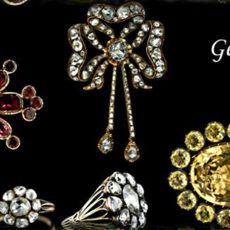
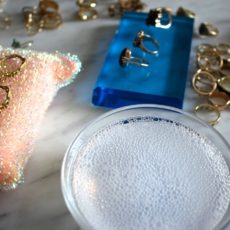
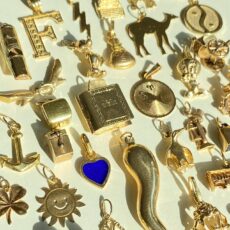
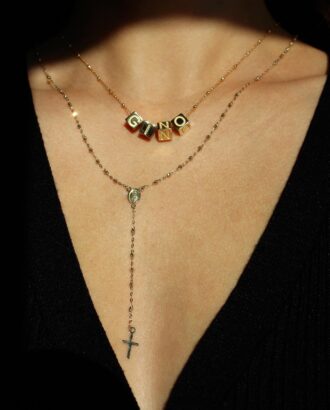
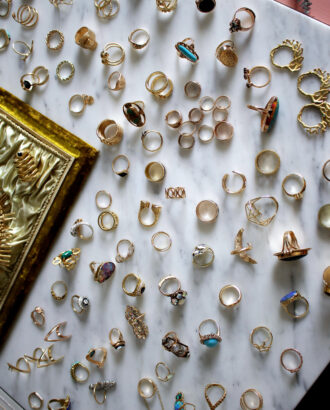
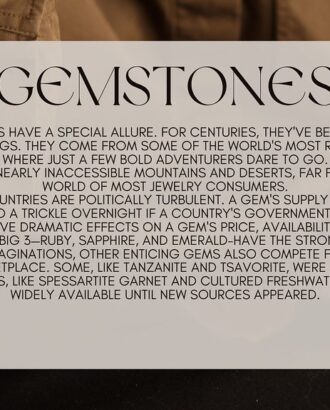
Vàng Bạc Gia Bảo August 28, 2017 at 3:48 pm:
In Vietnam, most jewelry products are sold through facebook or intagram services to young people is the main, not selling antique jewelry, old jewelry
M.E. Kain August 29, 2017 at 6:27 pm:
This is a fabulous page and I thought I would send along a few additional suggestions after more than 30 years in the jewelry business buying, selling, collecting and admiring-
-Do your homework and find a reputable appraiser in your area to confirm you got what you paid for- an EXPERIENCED appraiser is invaluable as they have a tremendous amount of skill in accessing the value of what you have purchased and it is often well worth the investment
-Always ask what the return policy is! A reputable dealer /shop will often allow you to return in a reasonable time if anything is not what they claim it is
-Make sure you ask if the stones are genuine or lab/man made as some dealers do not always disclose this very important information-they often DO NOT KNOW
-Familiarize yourself with the differences between pennyweight (dwt) and gram prices (this can be incredibly confusing) The metals on these pieces play a large part in the total price and it is often why we lose so much beautiful jewelry to the scrap heap:(…although prices usually wont vary based on market gold/platinum prices, a heavier piece will be more costly and might explain a higher price tag- in many cases it is ok to ask for the weight of the piece
-Read as many of Gem Gossip's blogs as possible as she has supplied the average jewelry aficionado with more helpful, interesting, easy to understand, concise information than anyone out there and I should know because I am old enough to be her mother!:) She has been an inspiration to me and one of the reasons I am now collecting vintage jewelry and have started an Instagram page!!